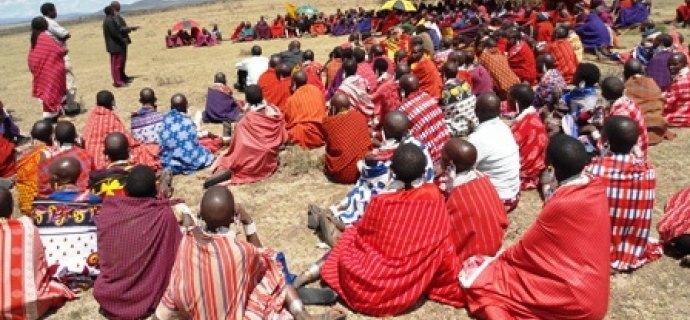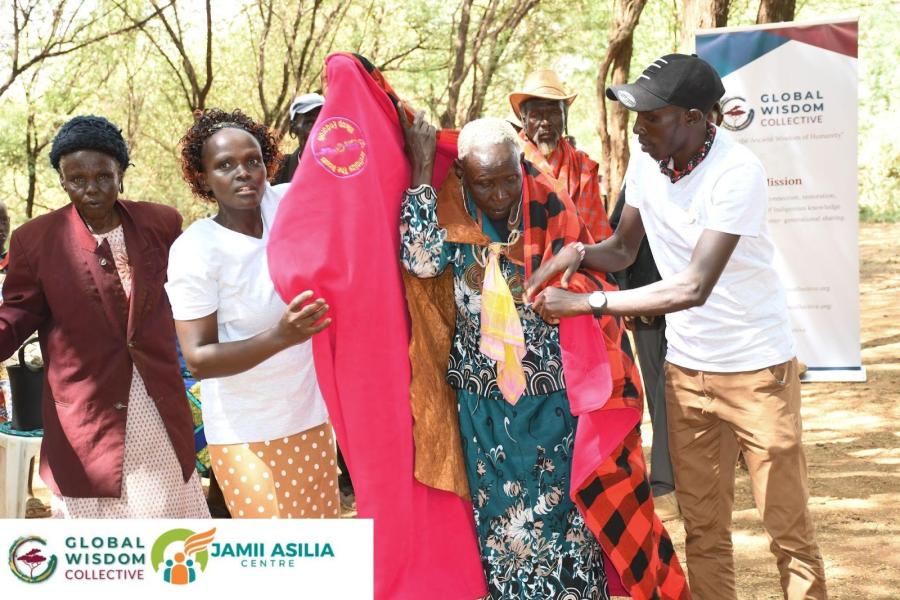
On February 26, 2014, with the assistance of EarthRights International (ERI), three Tanzanian Maasai communities turned to a United States federal court to support their ongoing legal battle over the land they lost to Thomson Safaris, a high-end safari outfitter based in Watertown, Massachusetts. The communities originally filed suit in 2010, in a local court in Tanzania, after they were forced from their land and blocked from vital water sources to make way for Thomson’s luxury safari camp near the world-famous Serengeti National Park.
Thomson’s website boasts that it offers “a way to experience Africa ethically, comfortably, and intimately.” The Maasai communities of Mondorosi, Soitsambu, and Sukenya have a different opinion: they say that Thomson illegally acquired their land and subjected them to violence, impoverishment, and intimidation. The villagers hope a federal court in Boston will compel Thomson and its owners, Rick Thomson and Judi Wineland, to turn over information that they believe will prove that the land confiscation was illegal. They also want to learn what Thomson knew about the serious injuries they claim to have suffered in the name of luxury tourism.
According to the villagers, the dispute with Thomson began in 2006, when 12,617 acres of ancestral land traditionally used for grazing and farming were sold to the owners of Thomson Safari without their consent. After the sale, the company renamed the land Enashiva and branded it as a luxurious “private nature refuge.”
The transformation has come at a high cost to the local Maasai villagers. “The land Thomson took is crucial for our people,” said Daniel Ngoitiko, elected councilor of Soitsambu Ward. “The water on that land is a precious resource that our cattle need to survive, and our families need to grow crops.”
The dispute has also led to repeated violence. The villagers accuse Thomson of burning their “bomas” or traditional homes. They also claim that local police beat and arrested villagers for trying to return to the land, and that they did this with Thomson’s full knowledge and cooperation. In 2009 and again in 2013, the United Nations Committee on the Elimination of Racial Discrimination (CERD) called for Tanzania to secure the villagers’ access to farming and grazing land and protect them from violence.
“This case is a prime example of the lack of accountability for international ‘eco-tourism’ initiatives like Thomson’s,” said Marissa Vahlsing, a staff attorney at ERI. “A company can claim to be eco-friendly or socially conscious. But if it fails to gain the consent of the indigenous communities that have traditionally lived on and cared for the land, its customers may be participating in the creation of ‘conservation refugees’ instead of contributing to sustainable development.
“The right to free, prior and informed consent is a firmly established principle of international law,” said Lucy Claridge, Head of Law at Minority Rights Group International (MRG), which has been supporting the communities in their struggle since 2009. “The Maasai have the right to give or withhold consent to proposed projects that may affect the lands they have lived on and used for years. Unfortunately, governments and companies often ignore this principle in the name of international investment”.
“We are optimistic that the U.S. court will recognize the importance of this case in Tanzania and will agree with us that this information is necessary for the Maasai villagers in their struggle for recognition of their rights,” said Mr. Rashid Rashid of KNR Legal, who represents the villagers in Tanzania, with support from MRG and pro bono representation from Tanzania’s Legal and Human Rights Center.
“We hope the action in the United States supports our efforts to seek truth and accountability for what has happened to our people and our lands,” added Ngoitiko.
The federal court action was filed under 28 U.S.C. § 1782, a law that allows people to obtain documents and information from individuals or companies in the United States to support foreign legal proceedings.
In addition to EarthRights International, the Maasai villagers are represented in the federal court action by Lauren Carasik of the Western New England University School of Law’s International Human Rights Clinic.
EarthRights International (ERI) is a nongovernmental, nonprofit organization that combines the power of law and the power of people in defense of human rights and the environment, which we define as "earth rights." We specialize in fact-finding, legal actions against perpetrators of earth rights abuses, training grassroots and community leaders, and advocacy campaigns, and have offices in Southeast Asia, the United States and Peru.
Minority Rights Group International campaigns worldwide with around 130 partners in over 60 countries to ensure that disadvantaged minorities and indigenous peoples, often the poorest of the poor, can make their voices heard. Through training and education, legal cases, publications and the media, we support minority and indigenous people as they strive to maintain their rights to the land they live on, the languages they speak, to equal opportunities in education and employment, and to full participation in public life. More information abuot MRG is available at http://minorityrights.org/.
Marissa Vahlsing (USA), +1 (202) 466 5188 x111, marissa@earthrights.org
Lucy Claridge (UK), +1 44 7866 741922, lucy.claridge@mrgmail.org



